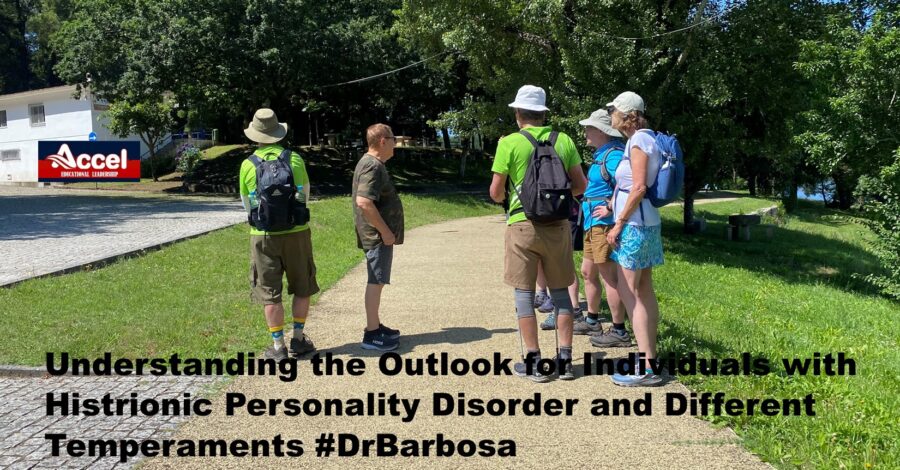Histrionic Personality Disorder (HPD) is a psychological condition that affects individuals’ behavior and interpersonal relationships. It is crucial to gain a comprehensive understanding of the disorder’s outlook and how it may manifest in different temperaments. In this article, we will explore the outlook for individuals with histrionic personality disorder, considering the influence of various temperamental traits and its impact on their social and occupational functioning.
Histrionic Personality Disorder: A Brief Overview
Histrionic Personality Disorder is characterized by a pattern of excessive attention-seeking, dramatic emotions, and a strong desire for approval and validation from others. People with HPD often exhibit attention-seeking behaviors, engage in provocative actions, and express their emotions in an exaggerated manner. While these behaviors may capture attention, they can also pose challenges for individuals with severe cases of HPD.
The Influence of Temperament
Temperament refers to an individual’s inherent behavioral and emotional tendencies. It plays a significant role in shaping how individuals with histrionic personality disorder experience and express their symptoms. Let’s explore the outlook for individuals with HPD based on five commonly recognized temperaments:
1. Sanguine Temperament
Individuals with a sanguine temperament tend to be outgoing, social, and optimistic. They are often energetic, expressive, and enjoy being the center of attention. For individuals with histrionic personality disorder and a sanguine temperament, the outlook may be somewhat positive. Their natural charisma and ability to engage with others can contribute to social and professional success. However, they may need to be mindful of the potential for excessive attention-seeking and work on maintaining healthy boundaries.
2. Choleric Temperament
Choleric individuals are assertive, ambitious, and strong-willed. They are often driven by a desire for control and leadership. For individuals with histrionic personality disorder and a choleric temperament, the outlook may be a mix of opportunities and challenges. Their assertiveness and ambition can help them excel in leadership roles or creative endeavors that require self-expression. However, they may need to be cautious about their tendency to seek validation and manage the impact it may have on their relationships and reputation.
3. Melancholic Temperament
Those with a melancholic temperament are typically introspective, thoughtful, and detail-oriented. They tend to be sensitive to criticism and may experience intense emotions. For individuals with histrionic personality disorder and a melancholic temperament, the outlook may be more challenging. Their sensitivity to criticism and emotional intensity can exacerbate their need for validation and attention. It is essential for them to focus on building emotional resilience, developing healthy coping mechanisms, and seeking professional support to navigate their interpersonal relationships effectively.
4. Phlegmatic Temperament
Phlegmatic individuals are known for their calmness, patience, and diplomatic nature. They often prefer harmony and avoid confrontations. For individuals with histrionic personality disorder and a phlegmatic temperament, the outlook may be relatively stable. Their calm demeanor and ability to navigate social situations with ease can contribute to their social and professional functioning. However, they may need to be aware of their inclination to seek validation subtly and ensure they are expressing their needs and emotions in a healthy and assertive manner.
5. Supine Temperament
Individuals with HPD and a Supine temperament may find it challenging to balance their desire for attention and validation with their natural inclination to avoid conflict. The Supine temperament’s reserved nature may conflict with the attention-seeking tendencies of HPD, leading to internal tension and a sense of incongruity. The individual may struggle to express their emotions openly and assertively, fearing that doing so might disrupt harmonious relationships.
Despite the challenges, individuals with HPD and a Supine temperament may possess unique strengths that can positively influence their outlook. The empathetic nature of the Supine temperament allows them to understand and connect with others on an emotional level. This quality can foster genuine empathy and support in their relationships, enhancing the quality of interactions and promoting understanding.
The Supine temperament’s peaceful and accommodating nature can contribute to maintaining harmony in relationships and creating a sense of stability. Their ability to actively listen and provide a supportive environment can be comforting for others, establishing a foundation of trust and emotional connection.
Mixed or Balanced Temperament
Many individuals exhibit a combination of temperamental traits, resulting in a balanced or mixed temperament. They may display a blend of characteristics from different temperaments, which can influence their experience of histrionic personality disorder. For individuals with histrionic personality disorder and a mixed temperament, the outlook will depend on the dominant traits and how they interplay with their disorder. It is important for them to acknowledge and understand their unique temperamental makeup to effectively manage their symptoms and strive for a fulfilling life.
Seeking Professional Help
Regardless of the temperament, seeking professional help is essential for individuals with histrionic personality disorder. Mental health professionals, such as psychologists or psychiatrists, can provide appropriate guidance, therapy, and interventions to support individuals in managing their symptoms and enhancing their overall well-being. Treatment options may include psychotherapy, medication management, and the development of healthy coping strategies.
Strategies for a Positive Outlook
Alongside professional assistance, individuals with histrionic personality disorder can implement strategies to improve their outlook and lead fulfilling lives. Here are some recommendations:
1. Self-Awareness and Mindfulness
Developing self-awareness and practicing mindfulness can help individuals recognize their emotional triggers and patterns of attention-seeking behavior. By cultivating self-reflection and staying present in the moment, they can gain better control over their thoughts and emotions.
2. Building Healthy Relationships
Focusing on building healthy and supportive relationships is crucial. Encouraging open and honest communication, setting boundaries, and practicing empathy can foster meaningful connections while reducing the need for constant validation.
3. Developing Emotional Regulation Skills
Learning effective emotional regulation techniques, such as deep breathing exercises, meditation, or journaling, can aid in managing intense emotions. These practices promote self-soothing and provide individuals with valuable tools to respond to challenging situations more effectively.
4. Cultivating Self-Worth
Encouraging a healthy sense of self-worth and self-acceptance is vital. Engaging in activities that foster personal growth, pursuing hobbies, and celebrating achievements can boost self-esteem and reduce the reliance on external validation.
5. Balancing Self-Expression
Finding a balance between self-expression and seeking attention is essential. Engaging in creative outlets, such as art, music, or writing, can provide alternative channels for self-expression, enabling individuals to express themselves authentically without overwhelming others.
Conclusion
In conclusion, individuals with histrionic personality disorder can experience varying outlooks based on their temperamental traits. The influence of temperament on their symptoms and interpersonal relationships should be acknowledged and addressed. Seeking professional help, implementing effective strategies, and fostering healthy relationships are key to managing histrionic personality disorder and leading fulfilling lives.
Maria Pinto Barbosa PhD / PHD-Doctor of Philosophy in Cristian Clinical Counseling
ACCEL-Holistic Life Coach / Founder-Director of ACCEL Educational Leadership / Specialized on Temperaments – Personalities #DrBarbosa
Discover more from Dr Maria Barbosa
Subscribe to get the latest posts sent to your email.






